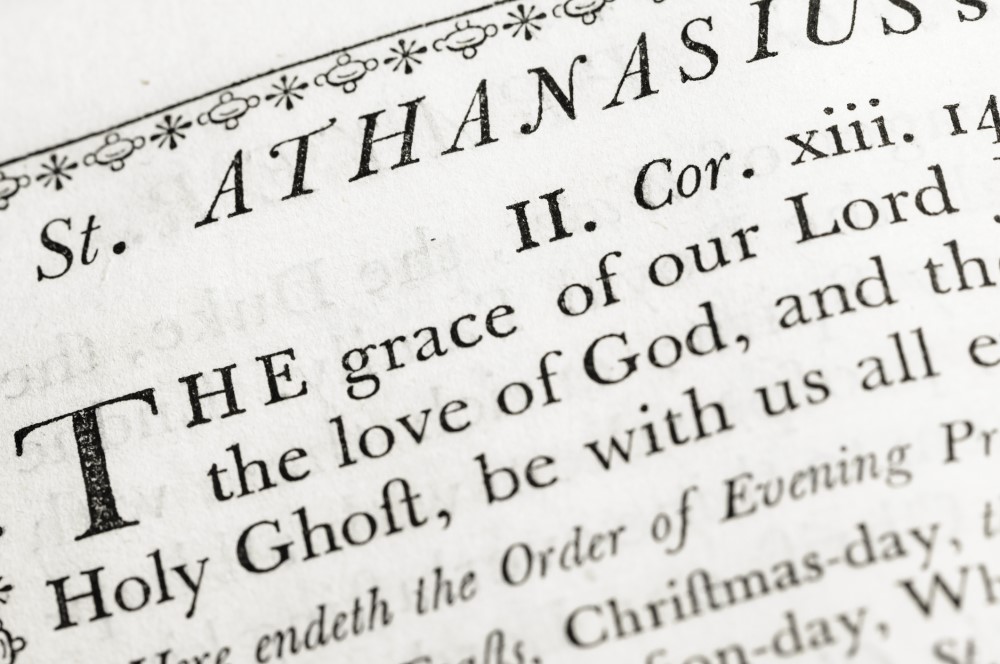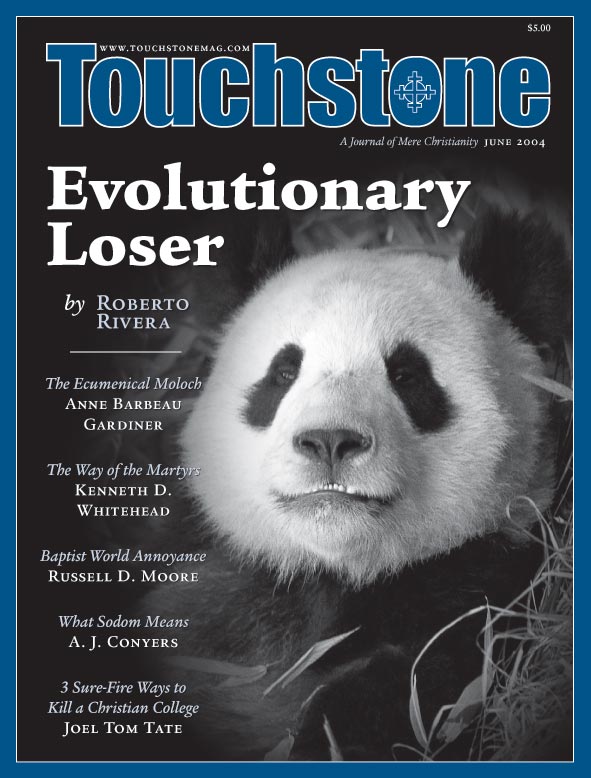Feature
A Sensible Growth in God
How to Make True Progress According to St. Athanasius
Progress is the usual name given to the superstition that mankind is constantly improving its own lot, on its own steam, by its own lights, rising to ever loftier heights of knowledge and goodness. The political consciousness of mankind, so a true believer in human progress assumes, is happily expanding its understanding to include ever larger and more mature freedoms, and public morality is less and less inhibited by the unenlightened strictures of the Christian faith.
The progressivist typically misinterprets Western technological achievement as the assurance of things hoped for. He holds by faith alone that the empirical and social sciences are the instruments by which the world’s salvation from ignorance and want will be accomplished. We are heading steadily, though with some unfortunate setbacks, towards the fullness of time, the end of history, the consummation of all human hopes and desires: a time of more wealth, more security, more happiness, more fulfillment; of better lives, better communities, better ecology, better world order, much better sex . . . etc., etc.
But, as has frequently been noted, we have just quitted the most modern yet the most violent of centuries, and our progressive civilization gives every impression of collapsing from within. What needs to be questioned, indeed raked over the coals, is the secular notion of progress. An increase in man’s ability to control his world does not, as the wisdom traditions of many cultures were aware, necessarily indicate human progress at all. That we can now fly in hours where once we had to walk for months says nothing about our spiritual, intellectual, moral, or even material progress, and may even prove inimical to it.
Human nature has shown no general advance whatsoever in goodness, kindness, peacefulness, and so forth, as the result of better technology. Despite the propaganda and cheery myths about secular (technological) progress, we cannot fail to know or sense the massive cultural disillusionment of our own age, a pervasive nihilistic mental gloom relieved only—if at all—by the distractions afforded us for the indulgence of our (often worst) appetites.
No Fullness
No, we do not appear to be heading towards the fullness of time. Except that, as the Christian knows, the fullness of time has already come. As Paul wrote to the Galatians, “When the fullness of time had come, God sent forth his Son, born of woman, born under the Law, to redeem those that were under the Law, that we might receive the adoption as sons” (4:4–5). The fullness of time “happened” when God the Word and Son of the Father assumed a complete and sinless human nature and “tented among us” two millennia ago in Roman-occupied Judea. The End of history arrived in history. The consummation of all human hopes and desires walked the earth in first-century Palestine.
No other fullness of time is to come. No other fullness of time can come. The end to human suffering that secular progressivism promises will be found only in this fullness of time: partly in Christian life now and fully in the ultimate in-breaking of eternity and the as-yet-unrealized eschaton by which this fullness is made final and complete. We Christians expect—with a hope by comparison with which any secular notion of progress shrivels like an ant under a magnifying glass in the heat of a summer sun—the ultimate progress: the transfiguration of a redeemed humanity and cosmos.
We should, as Christians, demythologize our contemporary secular myths, particularly the myth of progress, which prevents so many from seeing where the only true progress is to be found. In a similar way, our earliest Fathers in the faith had to demythologize the pagan world they had inherited, to plant the gospel among pagans enslaved to their world’s mythology.
The myths of the old world they were displacing were not myths of progress, as ours are; they were quite nearly the reverse, myths of a glorious golden past. The Fathers, however, countered those myths with the uniquely Christian concept of progress, one rooted in the explosive revelation that our God had appeared in human flesh so that we could by grace become like him. This still remains, after twenty centuries, our understanding of progress, and it is the proper response to the secular mythology of progress.
Whether a culture’s mythology points to a glorious past or to a glorious future, it is the Christian’s call to be the realist—in the exact metaphysical sense of that word—and point to that which can be encountered in a direct and relational way in the here and now. The Christian gospel is about living truth, not insubstantial human fantasies. It offers a genuine experience of human progress, one that can be lived by every believer in Christ in the present. It looks back and looks forward and looks right now to Christ, “the same yesterday, today, and forever.”
With this in mind, I wish to reflect on the great treatise of St. Athanasius of Alexandria (295–373), On the Incarnation of the Word, as a classic treatment of the Christian view of human progress. A statement of timeless Christian truth written within the largely pagan context of early fourth-century Greco-Roman Egypt, it remains a theological masterpiece for our time as well. Remarkably, Athanasius wrote it in 318 at the age of only twenty-three. It is imbued with the characteristic biblical learning and theology of the fourth-century Alexandrian school of theologians, its imagery and apologetic power radiating all the sound mystical intensity of the latter.
An Invitation
Athanasius was not writing “apologetics”; that is to say, he was not writing a rational defense of the faith to counter the arguments of unbelievers, although the work is not without its apologetic passages. At its heart, On the Incarnation of the Word is an invitation to Christian experience. In short, it is evangelistic and catechetical in nature.
Addressed to a possibly fictitious neophyte named Macarius (i.e., “Blessed”), who is being encouraged to see the reasonableness of the Christian vision and to enter deeply into it, it is a statement of the Christian vision of things, and as such, it counters all the alternative visions of the world, including the progressive’s. But it does this primarily as an invitation to know the God who, made flesh, became the living, tangible invitation to a transformed life—one full of the promise of progressing in the experiential knowledge of God.
In the book Athanasius expounds the meaning of this invitation, this revelation of Christ’s Incarnation in “the fullness of time,” showing in effect that it is a door leading us into the mystery of the Trinity. Beyond the invitation, beyond the iconic and visible (“God was in Christ”), is the otherwise inexpressible and essentially apophatic reality of God the Holy Trinity. For Athanasius, as with all the Fathers, one must participate in the revelation of these truths to understand them, or else come away knowing only the verbal forms of the doctrine and consequently lack any notion of the experiential knowledge to which the doctrine points.
Therefore, in a fashion customary among the Fathers, Athanasius is careful to connect what he is seeking to explain with the need for ascetical practice, that is, with an experience of approaching the doctrine he has expounded, especially as it is to be sought further in the Scriptures, in the proper way. At the end of the book, Athanasius makes this significant statement to those who are seeking the blessedness Christ offers:
But for the searching of the Scriptures and true knowledge of them an honorable life is needed, and a pure soul, and that virtue which is according to Christ; so that the intellect, guiding its path by it, may be able to attain what it desires, and to comprehend it, in so far as it is accessible to human nature to learn concerning the Word of God. For without a pure mind and a modeling of the life after the saints a man could not possibly comprehend the words of the saints.
Thus, Athanasius continued, the man who wanted to understand the mind of the saints—and to see what they saw—must “begin by washing and cleansing his soul, by his manner of living, and approach the saints themselves by imitating their works; so that, associated with them in the conduct of a common life, he may understand also what has been revealed to them by God.”
The book ends a few lines after this, leaving the reader with this call to asceticism, that is, to a life—an experience—of Christian discipline, and this life is the beginning of genuine human progress. Orthodox doctrine and asceticism are essentially one, and thus, both are necessary for participation in the salvation made available in Christ, a radical transfiguration of the entire person into the image of the Image of God. Athanasius invites the reader to participate in Christian experience and thus discover the truth for himself.
Athanasius is saying that the neophyte’s intellect needs to grasp the Word of God—for which, in fact, it was made. For it to do so, he must enter into the purification of his way of life in accordance with the common life of those who have themselves come to know God (the saints).
The foundation of the Christian’s personal and communal life is therefore the intention to imitate the saints and to strive for the reality of holiness that comes from the immense grace of the Incarnate Logos. (Athanasius had already developed this traditional idea in the final section of the Contra Gentes, the earlier treatise that is the first half of the elaborate literary diptych of which On the Incarnation is the second half.)
Doctrine & Discipline
Athanasius goes no further than to invite the reader to this experience. He says nothing about the Holy Spirit, prayer, the sacraments, fasting, worship, or practical Christian obligations in engaging the world. In his era, these were matters for oral teaching. But there is one line, one-third of a sentence at almost the end of the book, which illumines the whole doctrine of the work and gives us a startling lightning-flash of the highest knowledge revealed in the Incarnation. It simply states: “He was humanized that we might be deified” (Autos gar enenthropesen, hina hemeis theopoiethomen). Momentarily, then, is seen the New Testament belief that Christians are “partakers of the divine nature” through grace (2 Peter 1:4; see also 2 Cor. 3:18; 1 John 3:2–3).
This profound truth of deification in Christ—one the perceptive reader might have reasonably expected to be reserved only for the fully initiated—is placed by Athanasius in the context of a series of refutations, running throughout the last third of the book, of possible Jewish and Greek criticisms of orthodox Christian faith. While using history and Scripture to refute the Jews and the language of philosophy and Greek religion to refute the Greeks, he offers this transcendent goal of the Christian gospel—which is the true goal of Christian progress.
That this assertion should appear at all in the apologetic portion of the book is both a reminder and a challenge that the Christian’s hope is not ultimately bound by matters of history or philosophy, that it is not reducible to a series of arguments about Scripture or intellectual abstractions. Apologetics is not where the proof of Christianity really lies. Rather, we find the proof in living strenuously in Christ and thereby increasing in his likeness.
How does man increase (or progress) in this likeness? Through the contemplation (theoria, in Greek) of God. And what makes this contemplation possible for sinful man? The fact of the Incarnation: God can be seen and contemplated in Christ. Only in this way, dependent on the goodness of the Creator, can the intellect be restored, and we can regain in ourselves the image of God that we lost by the fall.
There is a beautiful sentence in The First Greek Life of Pachomius that gives us a taste of what Athanasius means by the practice of contemplation: “And because of the purity of his heart [Pachomius] was, as it were, seeing the invisible God as in a mirror.” He is a model of the contemplative man, the redeemed man who sees God in the mirror of his own soul. He can do this because he has first recognized God in Christ, and has become a fully “rational man” (logikos) through the Word (Logos) made flesh.
When Athanasius wrote of contemplation, he meant something as experiential as the Christian’s discipline of standing, sitting, or kneeling and praying deeply with an interior rumination on the revelation provided in the gospel of the Incarnation. He meant a blending of heart and mind in the single, all-important pursuit of the vision of God in Christ. And he meant progressing in it, in bodily practice and in the spirit. Given the age in which he wrote, one in which men and women were fleeing into the desert to prove their faith in the rigors of monastic life (an enterprise that Athanasius himself would one day glorify in his Life of St. Antony), one would expect to find here not merely a setting forth of dogmatic theology but just such a summons to experience the truth of the dogma.
Athanasius does this, and he tells us exactly what the basic material of our contemplation consists in: Jesus Christ and his incarnate life.
For, men’s mind having finally fallen to things of sense, the Word disguised Himself by appearing in a body, that He might, as man, transfer men to Himself, and center their senses on Himself, and, men seeing Him thenceforth as man, persuade them by the works He did that He is not man only, but also God, and the Word and Wisdom of the true God.
The world of the senses, therefore, that from which men have shaped their idols, is now sanctified by the Incarnation, and the role of the senses for salvation has been affirmed. Christ has entered and filled all creation, and he can in fact now be perceived in all created things by the believing eye. The perfect Image has been revealed, and our contemplation of him is the new way of seeing the invisible God. Through the senses is the experiential way to contemplative progress, guiding us beyond the doors of the visible and sensual and on into the unseen presence.
Man’s Regression
So it is that On the Incarnation tells us that the loss of grace in the fall—the great regression of mankind—is first of all the loss of the experience of the knowledge of God. Because God is the giver of life and being, the fall results in man’s descent into death and non-being—a radical disconnection from the goodness and life of God himself. For Athanasius, death is the reverse of the contemplation of God, the opposite of being a “rational man” in the image of the creative Word.
Men having despised and rejected the contemplation of God, and devised and contrived evil for themselves . . . death had the mastery over them as king. For transgression of the commandment was turning them back to their natural state, so that just as they had their being out of nothing, so also, as might be expected, they might look for corruption into nothing in the course of time.
Because God created man out of nothing, when by sin men lost “the knowledge of God and were turned back to what is not (for what is evil is not, but what is good is), they should . . . be everlastingly bereft even of being; in other words . . . they should be disintegrated and abide in death and corruption.” This is why the empirical and the social sciences cannot bring real progress: because they are for fallen man instruments of death, whatever he intends them to be.
Death is both monstrously alien to the goodness of God’s creation and yet frighteningly natural to what is made from nothing. Death is the decisive factor, the crux, the terrible paradox that makes imperative the option of being or non-being, the option of creation (intended to reflect its Creator’s very image) or utter disintegration, the option of existential regression or progression. (One is reminded of the philosopher Martin Heidegger’s definition of man as “being-to-death.”)
Death is the opposite of the contemplation—the vision—of God because it is opposed ontologically to God himself. It is the pulling away from him, the rejection of his creative goodness. It operates like a polluting cancer that diseases our soul and intellect and moral consciousness, so that what is good cannot be known. If ever there were a relevant theology for our age of mass murder, abortion, terrorism, war, ecological threat, AIDS, and the rest, it is this archaic yet ever pertinent one that faces death with real and metaphysical horror.
Mankind is “by nature corruptible” because his nature is derived from nothing. Its only hope of continued progress into being instead of disintegration lies in “the grace following from partaking of the Word,” who is the personal Creator and sustainer of all things. Originally this life-giving union depended on man “remain[ing] good,” that is to say, remaining in conformity with the nature of God.
Athanasius stresses the goodness of God. Because God is good, all things were created and have their being. The rejection of this goodness and the original grace of union with the Word—by which our natural mortality was intended to be changed in conformity to his immortality and our reason into the perfect reflection of the “logic” of the Logos—resulted in the only consequence possible: “The rational man [logikos] made in God’s image was disappearing, and the handiwork of God was in process of dissolution.”
God’s Response
Athanasius uses forensic terminology in his explanation of the fall, but this does not dominate his thinking on the matter (as it does not dominate St. Paul’s). Rather, it appears as just one nuance of a larger, more tragic cosmic drama. Death and sin, inextricably bound, imprison man’s existence. Evil permeates each and every man, dulls each one’s intellect, and perverts each one’s knowledge of God into sensual idolatry.
Neither the sensual witness of God’s creation, nor the testimony of the many lives of those who—against all odds—achieved a measure of holiness, nor even the giving of the Law, could restrain the dissolution. Instead, human beings “loaded themselves the more with evils and sins, so as no longer to seem rational, but from their ways to be reckoned void of reason. So, then, men having thus become brutalized, and demoniacal deceit thus clouding every place, and hiding the knowledge of the true God, what was God to do?”
The answer Athanasius gives, of course, is the classical one. God the Word became man and took into himself our mortal chaos. Jesus Christ was nailed to the Cross and drew the world with all its ills to himself upon that dark symbol of agonizing paradox, and yet his immortal life could not succumb to the dissolution of death. The divine life burst from the tomb, and this same life, possessing in itself the power of making a new creation from the old, passes to all who choose to love and unite themselves to Being rather than non-being.
It was unfitting that they should perish which had once been partakers of God’s image. . . . Whence the Word of God came in His own person, that, as He was the Image of the Father, he might be able to create afresh the man after the Image. But, again, it could not else have taken place had not death and corruption been done away. Whence he took, in natural fitness, a mortal body, that while death might in it be once for all done away, men made after His image might once more be renewed. None other, then, was sufficient for His need, save the Image of the Father.
In the book Athanasius accomplished the task he set out to do. He wrote a captivating overview of God’s purposes in the Incarnation of the Word and defended the doctrine against possible attacks from its cultured despisers. What lies beyond the last chapter of the work, with its call to holiness, is actual participation in the life of the Christian Church, and this means something more than intellectual assent to the doctrine itself.
True Progress
In Christ is our return to that Image that purifies and deifies. This is authentic Christian theology: the contemplative, experiential engagement with the Holy Trinity through the doorway of the Incarnation of the Word.
This, finally, is what the Christian understands to be the only genuine progress possible in this world: the progress of the redeemed and enlightened soul, transfigured from one degree of glory to another in the Holy Spirit, reflecting ever more and more the splendor of Christ. In Athanasius’s On the Incarnation we have no mere argument for Christian doctrine, but an invitation to experience the truth of the Christian life. The invitation is a call to abandon the mythologies of this dying world, and to “center our senses” on the Incarnate God, and thence to progress to that true beauty for which we were fashioned, which transcends the capacity of our senses altogether.
Addison H. Hart is retired from active ministry as parish priest and university chaplain. He is the author of Knowing Darkness: On Skepticism, Melancholy, Friendship, and God and The Yoke of Jesus: A School for the Soul in Solitude (both from Eerdmans). His forthcoming book is a study of the Sermon on the Mount. He lives and writes in Norheimsund, Norway.
subscription options
Order
Print/Online Subscription

Get six issues (one year) of Touchstone PLUS full online access including pdf downloads for only $39.95. That's only $3.34 per month!
Order
Online Only
Subscription

Get a one-year full-access subscription to the Touchstone online archives for only $19.95. That's only $1.66 per month!
bulk subscriptions
Order Touchstone subscriptions in bulk and save $10 per sub! Each subscription includes 6 issues of Touchstone plus full online access to touchstonemag.com—including archives, videos, and pdf downloads of recent issues for only $29.95 each! Great for churches or study groups.
Transactions will be processed on a secure server.
more from the online archives
calling all readers
Please Donate
"There are magazines worth reading but few worth saving . . . Touchstone is just such a magazine."
—Alice von Hildebrand
"Here we do not concede one square millimeter of territory to falsehood, folly, contemporary sentimentality, or fashion. We speak the truth, and let God be our judge. . . . Touchstone is the one committedly Christian conservative journal."
—Anthony Esolen, Touchstone senior editor










